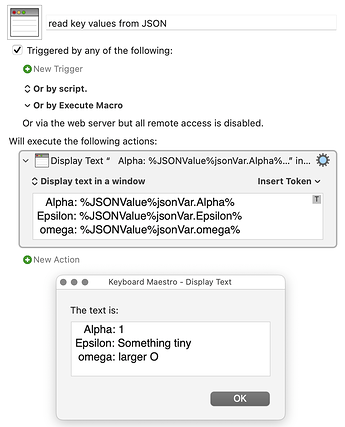Note that AppleScript records are prone to change the case of your key names, and that the references are case sensitive.
(JavaScript's records/objects are more flexible and relaxed):
Expand disclosure triangle to view example AppleScript
use framework "Foundation"
use scripting additions
on run
set recVars to {Alpha:1, Beta:2, Gamma:3, Delta:"Some change or other"} & ¬
{Epsilon:"Something tiny", lambda:"Something functional"} & ¬
{omnicron:"smaller o", omega:"larger O"}
set jsonString to my showJSON(recVars)
tell application "Keyboard Maestro Engine"
setvariable "jsonVar" to jsonString
end tell
jsonString
end run
-- showJSON :: a -> String
on showJSON(x)
set c to class of x
if (c is list) or (c is record) then
set ca to current application
set {json, e} to ca's NSJSONSerialization's dataWithJSONObject:x options:1 |error|:(reference)
if json is missing value then
e's localizedDescription() as text
else
(ca's NSString's alloc()'s initWithData:json encoding:(ca's NSUTF8StringEncoding)) as text
end if
else if c is date then
"\"" & ((x - (time to GMT)) as «class isot» as string) & ".000Z" & "\""
else if c is text then
"\"" & x & "\""
else if (c is integer or c is real) then
x as text
else if c is class then
"null"
else
try
x as text
on error
("«" & c as text) & "»"
end try
end if
end showJSON
